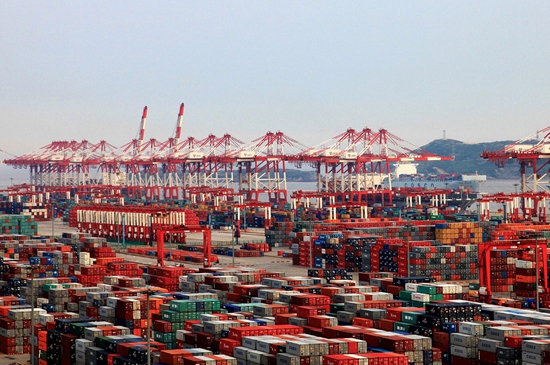
-
Foreign lines upbeat as China eases piggyback system
-
New policy allowing foreign trade containers between ports in China seen to cut logistics costs for exporters and importers
-
Foreign liners had been previously barred from conducting international cargo relay
-
Maersk prepares first shipment at Yangshan for the cargo relay
Foreign lines are upbeat as China eases its piggyback system, with some carriers now planning maiden calls to Yangshan Port in Shanghai by end of May.
Beijing freed up the coastal piggyback system for shipping of foreign containers between ports in the country, China Daily reported on May 10, quoting analysts.
The analysts hailed the move as China’s willingness to further open up. Zhou Zhicheng, a researcher at China Federation of Logistics and Purchasing, said allowing foreign containers between mainland ports should cut logistics costs for both exporters and importers.
He said the move would improve the utilization rates of container ships and relieve the tightness of shipping capacity to a certain extent.
Yangshan Port was opened last November to pilot as an international cargo relay hub for export containers originating in Dalian, Tianjin and Qingdao. This month, foreign liners will call Yangshan to take part in the new trade opening.
Cargo relay is the practice of a liner company to carry cargo from a foreign port to an overseas destination on its own vessels and then transfer the cargo to another vessel it owns in another port within the destination country. China had historically prohibited foreign vessels from taking part in cargo relay.
China Daily said Jens Eskelund, chief representative of Danish shipping and logistics giant A.P. Moeller-Maersk, welcomed the new policy allowing foreign carriers to do international relay. He said it is a tangible step for foreign carriers in China to achieve market access on reciprocal terms.
“International relay will allow us to improve services, giving our customers more flexibility and options for their shipments. We are preparing the first shipment in Yangshan terminal in Shanghai, together with the Lin-gang Special Area Administration and other relevant stakeholders,” Eskelund was quoted as saying.
The report said Asia Shipping Certification Services Co Ltd based in Hong Kong has been authorized by Beijing to carry out statutory ship inspection work in the Lin-gang Special Area. ASCSC is the first inspection agency that is not incorporated in the Chinese mainland.
The daily average container throughput in Yangshan terminal in March and April reached 66,000 and 59,000 twenty-foot equivalent units or TEUs, each accounting for 90% and 85%, respectively, of the average level seen in the first quarter.
There are now 193 companies that have resumed operations in the Yangshan Special Comprehensive Bonded Zone, or 85% of the total, and about 50% of the total employees in the bonded zone arrived at their workplaces physically, the report said.
“The coastal piggyback system will help boost logistics capacity, improve efficiency and provide more business opportunities for global companies to further expand their market presence in China,” Bai Ming, deputy research director at the Chinese Academy of International Trade and Economic Cooperation, was quoted by China Daily as saying.




